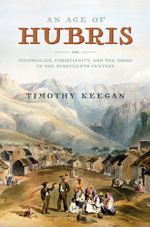Today, we are happy to bring you our conversation with Timothy Keegan, author of An Age of Hubris: Colonialism, Christianity, and the Xhosa in the Nineteenth Century.
What inspired you to write this book?
I first discovered a fascination for Africa, the continent to which I belonged but which was closed off by the dark, oppressive shutters of apartheid, when as a student in Cape Town in the 1970s I was introduced to the burgeoning new field of African history. We were all dreaming of a different world, and Africa opened up as an alternative to Western Civilization approaches to historical study. It was a continent alive with novelty and difference, accessible through the work of anthropologists as well as through more traditional documentary research. I have never lost that sense of excitement, and this book about the richly revealing collisions and mixing of the worlds of missionaries and Africans in an age of imperial hubris is one result.
What did you learn and what are you hoping readers will learn from your book?
I am one of those historians who believe that large conclusions about the world are possible from the most local of canvases. There is no more central theme in modern history than the drawing of European and non-European peoples into single global imperial systems. There is no better way to understand such encounters and the complex syntheses of culture and society that resulted from them than by narrowing the focus to local specifities, indeed to the view from the receiving end of differential power relationships. My intention with this book is to make one such arena, that of the Xhosa people of South Africa, come alive as a borderland where the clash of diverse peoples and cultures produced novel syntheses. New forms of exploitation and oppression resulted, but also new possibilties and worlds of opportunity.
What surprised you the most in the process of writing your book?
I have been surprised by the extent to which the traditional centers of academic research in the Global North continue to dominate research on the Global South. I have been surprised by how much research on the history of Africa has been dominated by scholars whose primary focus is not the peoples of Africa, but rather the academic communities of their home countries. I have been surprised by the extent to which academia has become dominated by the idea that only people of a particular identity should be allowed to write about people like themselves. I have been surprised by the way in which African people (those of my acquaintance) welcome my interest in their history, which is ultimately the history of all of us.
What’s your favorite anecdote from your book?
The religious beliefs and practices that the missionaries brought with them had profound influences on Africans, albeit in ways that missionaries could not always have foreseen, apprehended, or approved. Chief Maqoma, preeminent Xhosa politican, diplomat, and military hero, was one striking example of how lives could be changed by the encounter. Maqoma was intrigued by the missionaries. He studied their writing, their teaching, their explanations of how the world worked. He distanced himself from the traditional chiefly realm without ever himself becoming a Christian. He ultimately went to war with a vengeance when dispossessed of his patrimony, and ended his long, turbulent life as a prisoner on Robben Island. In his moment of ultimate defeat, he expressed his satisfaction that it was, indeed, the Christian God who would ultimately judge his colonial persecutors.
What’s next?
This book draws largely on the rich missionary sources and focuses on the period before formal colonial rule was imposed on the Xhosa chiefdoms. I am already well into writing a follow-up study that deals with the imposition of colonial rule from the middle of the nineteenth century onwatds, the diverse and complex ways in which colonial power and chiefly authority interacted, clashed, and fought, even feeding off each other to mutual benefit. It deals with the socioeconomic transformations set in train in a labor-hungry colonial economy. It examines the rise of new Christian African elites, the beginnings of a new assimilationist kind of resistance politics, and the ways in which Africans organized themselves to cope with and confront the encroaching tentacles of colonial hegemony and racial capitalism.





